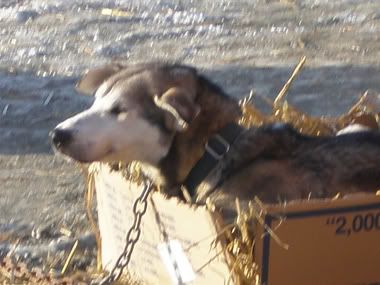
Written by Nancy Duresky
Wednesday, March 21, 2009
When you work in the dog lot and then go back the next day, some of the dogs you cared for are gone. After a musher and the dogs have recovered and rested, Alaska Airlines ships the dogs back to Anchorage for the mushers. (Alaska Airlines is one of my most favorite airlines, not just because they support the Iditarod mushers, but because of the wonderful way they have treated me over the years.) So, a dog that you cared for, that you petted and bonded with, is gone. And it’s a little loss.
Several years ago, I had a dog, Vicky-dog, a terrier mix. I got her in Texas and every day while I was writing my dissertation, Vicky-dog and I would walk for an hour beginning at 4 pm in the Texas hill country. That wonderful dog saw me through a marriage, two children, a divorce and a re-launch of my career. With that dog, I bought my first car myself, bought my first house myself, and moved five times. And then she was 17 and had a seizure. One of my sons and I took her to the vets. I held her in my arms and the vet injected her with the medicine that would put her to sleep and she died in my arms. It’s been 12 years and I still puddle-up when I remember the love I had for that dog and the love she had for me.
Think of how much more the mushers feel for the dogs in their kennel and on their team. What I went through with Vicky-dog by my side created a bond. And the mushers probably feel so much more. There are countless times on the trail that the dogs are not only at the mushers side, but the dogs are keeping the musher safe. Great lead dogs are able to follow the scent of a trail through a blizzard. They pull the musher up hill, across rivers, through overflow, and over the ice of the Bering Sea. The bond they have with the musher is beyond even the bond I had with Vicky-dog. Imagine what the feeling is when a musher loses a dog from his kennel.
This year, a few dogs have been lost on the trail. I don’t know the details of what happened on the trail. That will be investigated. I do know that the cases I have seen with my own eyes, where a musher loses a dog, the musher looks as if his or her guts were ripped out and yet, has to go on living. There is a grief and a sadness I cannot describe here because it is beyond words.
Back home, when I have talked about the Iditarod, some people have commented that they have heard others say something about cruelty to animals. I’m no expert, and I’m no great judge, I’m just a lady who comes to Nome every year to volunteer. What I see are dogs that love to run, love to pull a sled and love to go. In fact, even thought I loved Vicky-dog, after seeing the dogs in harness, I won’t have another dog in the city, because I know how dogs are supposed to live – and it’s not cooped up alone at home while I work long hours every day. The mushers give up all the comforts I have to live next to their kennel and care for their dogs, do hard labor for their dogs, every day of their lives. They give their dogs a life that is heaven on earth.
So, as some of the dogs that I have fed, and petted, and for whom I have scooped poop, leave me, I feel a little sadness. And I share one part of the sadness that all of us experience who have loved dogs and lost them.

